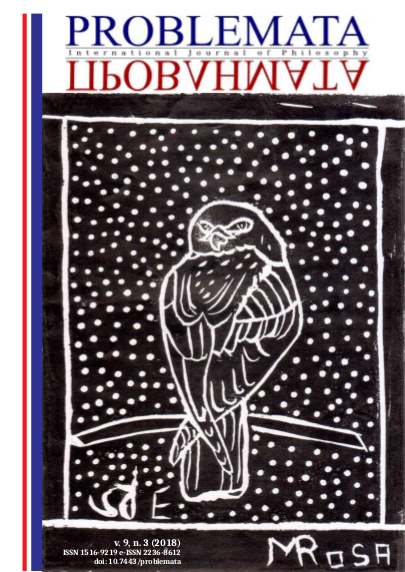THE HELENISTIC THINKING IN THE DIDACTIC BOOKS OF PHILOSOPHY FOR HIGH SCHOOL: AN ANALYSIS OF BOOKS PROVIDED BY PNLD
DOI:
https://doi.org/10.7443/problemata.v9i3.41671Keywords:
textbooks, Hellenistic philosophy, fragments of texts.Abstract
The article presents a comparative analysis of the books of philosophy of high school offered by the National Program of the Didactic Book (PNLD) 2015 to the public network of Brazilian education, specifically the themes and questions around the Hellenistic philosophers. For this purpose, we observe the concepts and the use of fragments of philosophical texts that collaborate to the understanding of the subjects by the students, as well as the accomplishment of a more complete work by the teachers. From the conclusions of the research, we noticed that most of the works present concepts of Hellenistic thinkers, but, with few exceptions, it did not pay attention to the use of fragments of texts.
Downloads
References
ARANHA, Maria Lúcia de Arruda e MARTINS, Maria Helena Pires. Filosofando: introdução à filosofia. 5ª ed. São Paulo: Ed. Moderna, 2013.
GALLO, Sílvio. Filosofia: experiência do pensamento. 1ª ed. São Paulo: Scipione, 2013.
CHAUÍ, Marilena. Iniciação à Filosofia. 2ª ed. São Paulo: Ed. Ática, 2014.
COTRIM, Gilberto e FERNANDES, Mirna. Fundamentos de Filosofia. 2ª ed. São Paulo: Ed. Saraiva, 2013.
MEIER, Celito. Filosofia: por uma inteligência da complexidade. 2ª ed. Belo Horizonte: Ed. Pax, 2014.
Ministério da Educação, Secretaria de Educação Básica. Guia de livros didáticos: PNLD 2015: filosofia: ensino médio. Brasília, 2014. 52p.
RATIER, Rodrigo e SOARES, Wellington. Livro didático: como usá-lo com equilíbrio. Nova escola. Fortaleza, 09/07/2017. Disponível em: https://novaescola.org.br/conteudo/1731/livro-didatico-como-usa-lo-com-equilibrio.
Downloads
Published
Issue
Section
License
Authors who publish with this journal agree to the following terms:
- Authors retain copyright and grant the journal right of first publication with the work simultaneously licensed under a Creative Commons Attribution License that allows others to share the work with an acknowledgement of the work's authorship and initial publication in this journal.
- Authors are able to enter into separate, additional contractual arrangements for the non-exclusive distribution of the journal's published version of the work (e.g., post it to an institutional repository or publish it in a book), with an acknowledgement of its initial publication in this journal.
-
- Authors are permitted and encouraged to post their work online (e.g., in institutional repositories or on their website) prior to and during the submission process, as it can lead to productive exchanges, as well as earlier and greater citation of published work (See The Effect of Open Access).





